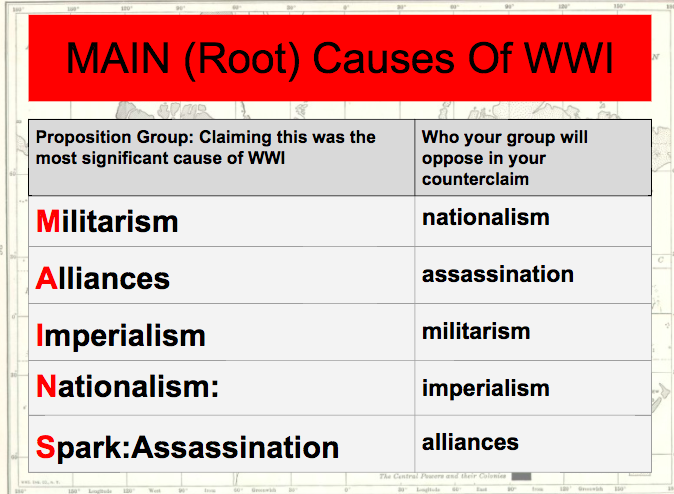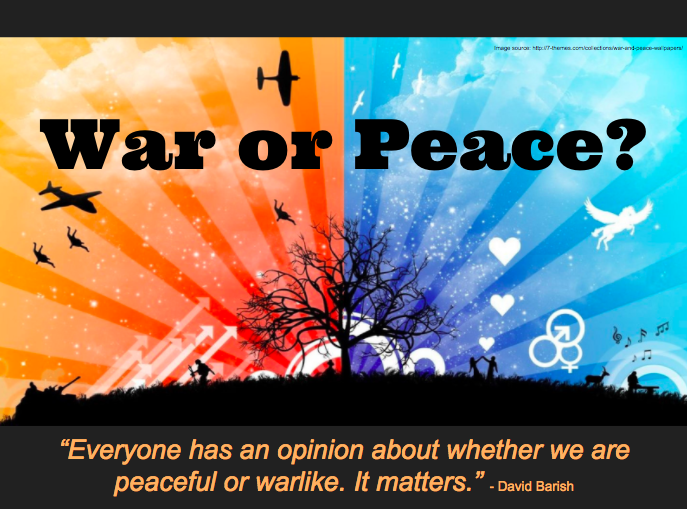|
After today's formative vocabulary quiz on WWI you will work with your group to begin preparing for your role in next class' formative debate on the most significant cause of WWI. Your group has been assigned a cause you will be arguing is the most "significant"; your group is also assigned to another cause that you will be refuting in your rebuttal in the debate and will need to develop a counterclaim and provide evidence to strengthen your argument that the other cause is less significant--and evidence to support your claim why your cause is the most significant cause of the war. This debate isn't about winning (tho. that can be fun) but about learning how to develop strong arguments you can support and how to develop strong counterclaims that serve the purpose of both refuting other claims and further strengthening your own claim/argument. Helpful Links for today's class:
Today, students will work on developing the missing "Document G: Nationalism" for the DBQ packet. To be ready to work on the DBQ, students should have completed the homework, having found a primary or secondary source prompt (political cartoon, letter, speech, map, graph, etc.) representing Nationalism prior to 1914. Students should have completed the OPVL for this source prior to coming to today's class. In class today, you will work with a group to give and receive feedback on the source used. You will then complete steps #2-4 during class today. Helpful Links for today's tasks: HW: Read “We wage war to end war”, CH. 17, The Human Story.Read "We Wage War to End War", CH. 17 in The Human Story.
Take notes in Unit 3 notes document. Notes should focus on the MAIN Causes + the Spark (Assassination of Archduke Franz Ferdinand) of WWI. Short formative Vocab Quiz on WWI Next class! Use this Quizlet Flashcard set to study. The DBQ Task document has been dropped in your WH Drop folder.
Helpful Links for this week's tasks: In today's class we will be discussing human nature, the history of human behavior with regards to whether we behave more warlike or more peaceful. Helpful Links for Today's Class:
EXIT TICKET SCHOOLOGY DISCUSSION: "ARE WE MORE WARLIKE OR MORE PEACEFUL"? "Everyone has an opinion about whether we are peaceful or warlike. It matters." - David Barash
HW: Read "Peace & Conflict"; take notesRead "Peace and Conflict" chapter (PDF) and take notes in your Unit 3 Notes Document. Notes should be specific evidence to help you answer the following 2 questions (these are the 2 guiding questions of the text you will read for HW):
HW Source: Jacob, Sheeba, et. al., Chapter 15 “Peace and Conflict”, Exploring Global Issues: Social, Economic and Environmental Interconnections, Facing the Future, 2013, pp. 267 - 283. Welcome back!
HW: Take Notes on MAIN CAUSES of WWIThere is a document placed in your WH Drop folder for taking notes on the MAIN causes of WWI. This is to help you prepare for the next class. Use the link to the presentation on MAIN Causes of WWI for sources to gather information for taking notes. You do NOT need to watch all of the videos or read through all of the sources provided--pick & choose from the presentation which sources you want to use for note-taking.
Due at the beginning of next class. |
Mrs. Stewart's CourseYou'll find a daily agenda posted here for each day that class meets Archives
May 2020
Categories |


 RSS Feed
RSS Feed